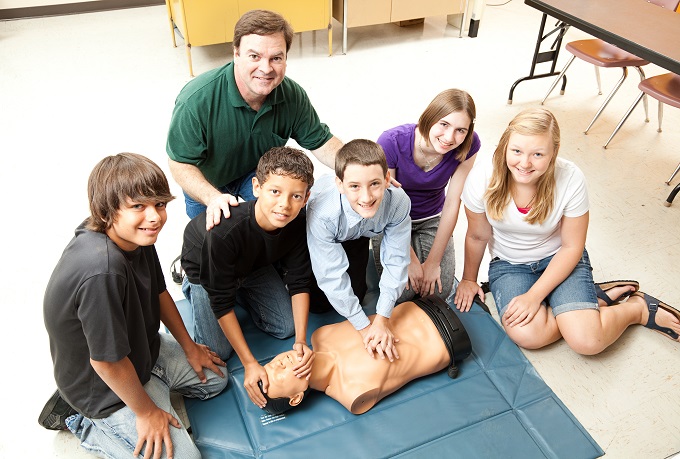
A group of teenage students learning CPR life saving techniques in class.
Approximately 12% of all out-of-hospital cardiac arrest victims in New Zealand survive following emergency CPR. Teaching children to handle a health crisis with basic first aid could also help increase awareness of common signs and symptoms of a cardiac event or stroke.
The New Zealand Resuscitation Council urges the NZ government to rise to the standard recently set by English schools, and teach children first aid and CPR as a core part of the health and physical education curriculum.
“If the English can do it, so can we,” says Kevin Nation, Chief Executive of the NZ Resuscitation Council.
“Resuscitation techniques sometimes seem more daunting to attempt than they really are, so it’s fantastic to see children being taught these invaluable skills.”
The NZ Resuscitation Council believes a generation of children confident in their ability to save lives can have a tremendous impact. We will all benefit from a safer, more productive society with reduced healthcare costs.
Two hours teaching annually, beginning at 12 years old, is enough to reach not only the children themselves but their wider communities.
“Kids come home buzzing to share what they learn, and it could be their siblings or parents who then go on to save a life,” says Mr Nation.
“This is an internationally established, common sense policy, and with the government already reviewing our educational curriculum we believe this is the perfect time to discuss teaching CPR in every school”.
The much-delayed English draft curriculum is now out for consultation, generating discussion from teachers.
Research from AUT demonstrates arts, culture and recreation have positive impacts on all aspects of…
How effective has the school phone ban been in achieving its aims? Researchers from the…
School camps and excursions deliver hands on learning experiences, helping to consolidate classroom learning.
Innovations in AV technologies present new opportunities to engage with students. We look at how…
A new report from the University of Auckland’s Our Voices Project asks young people what…
This website uses cookies.